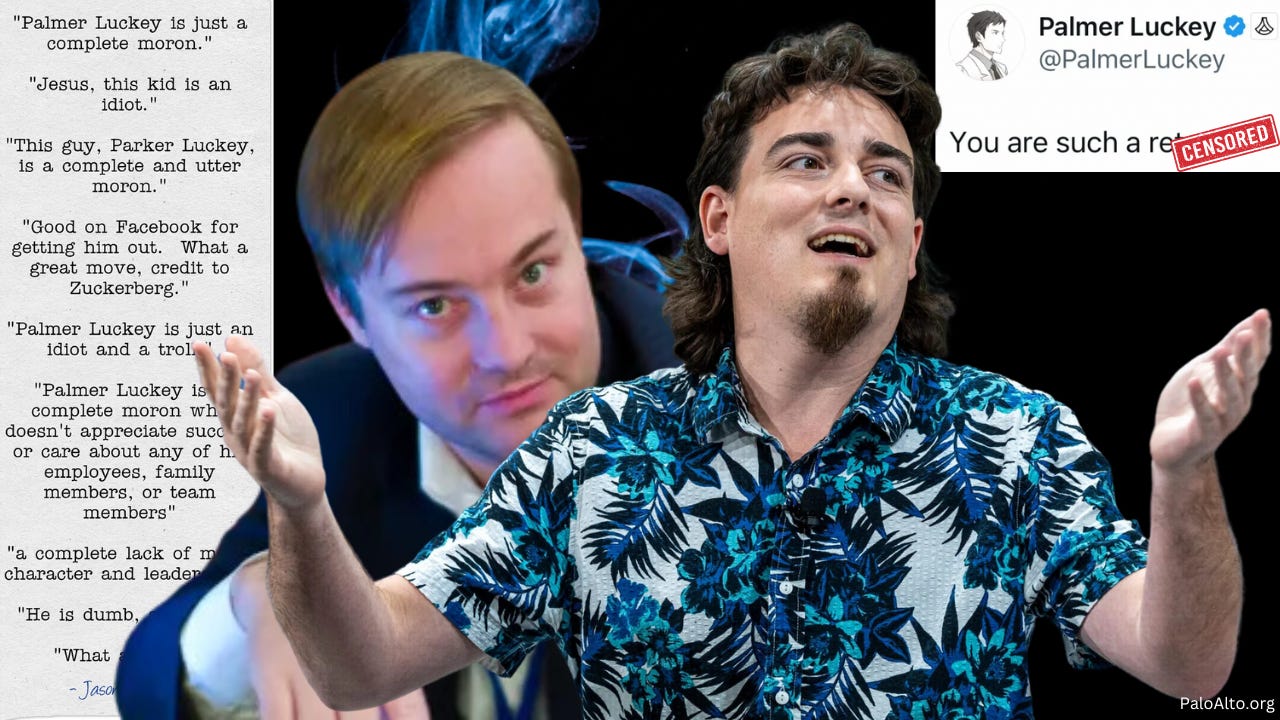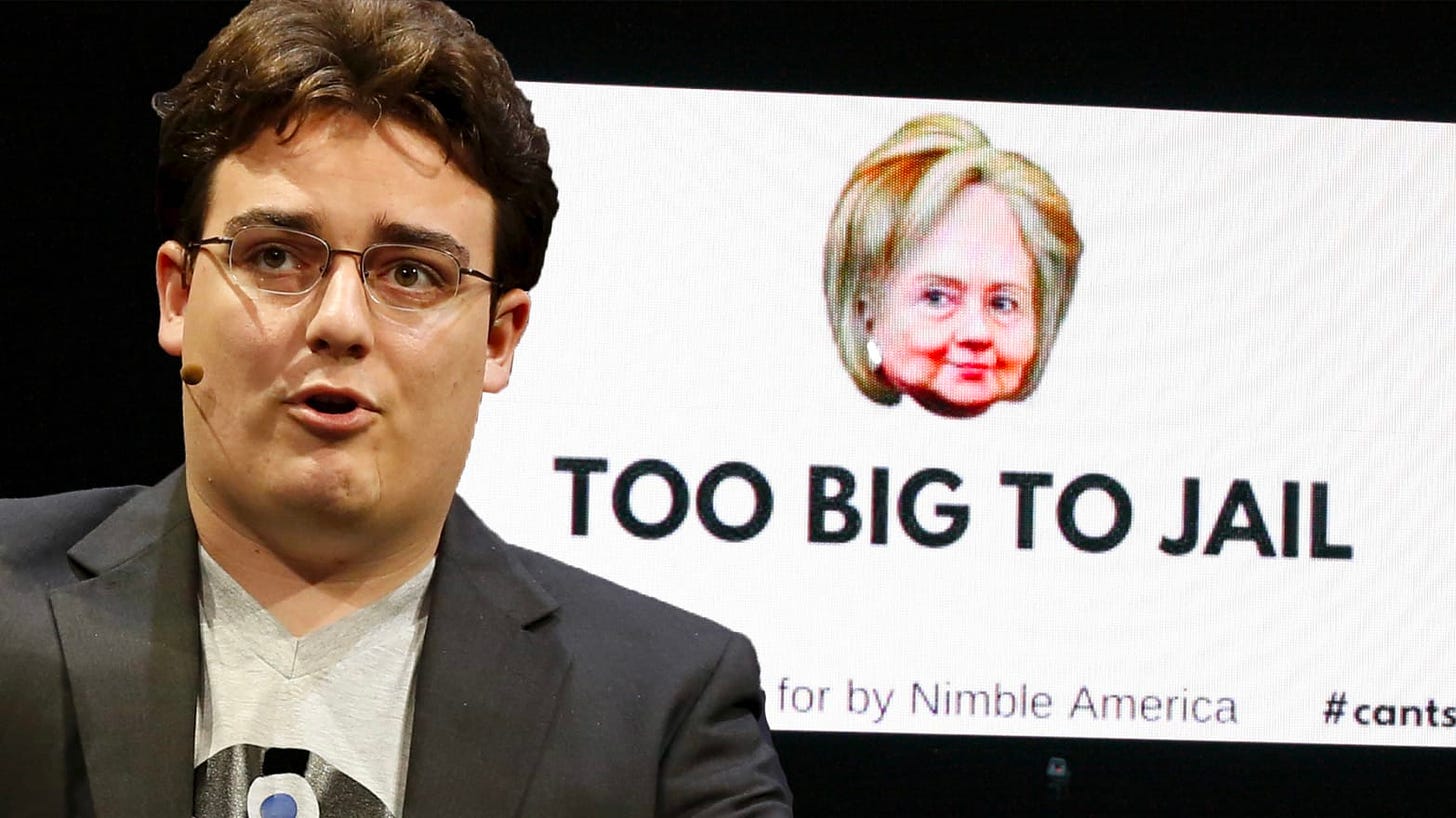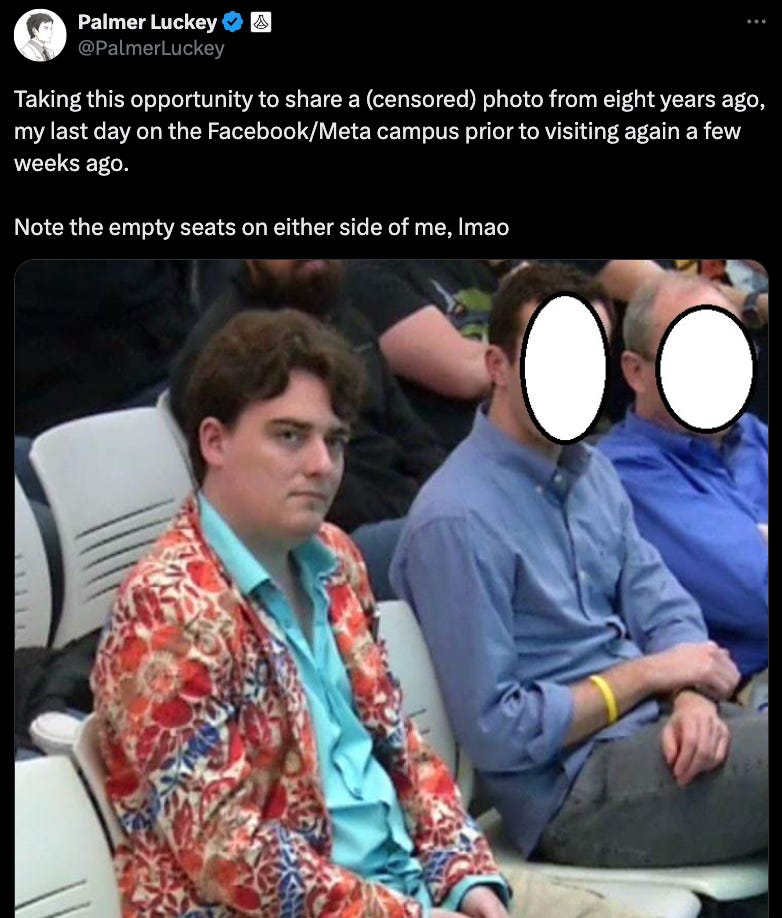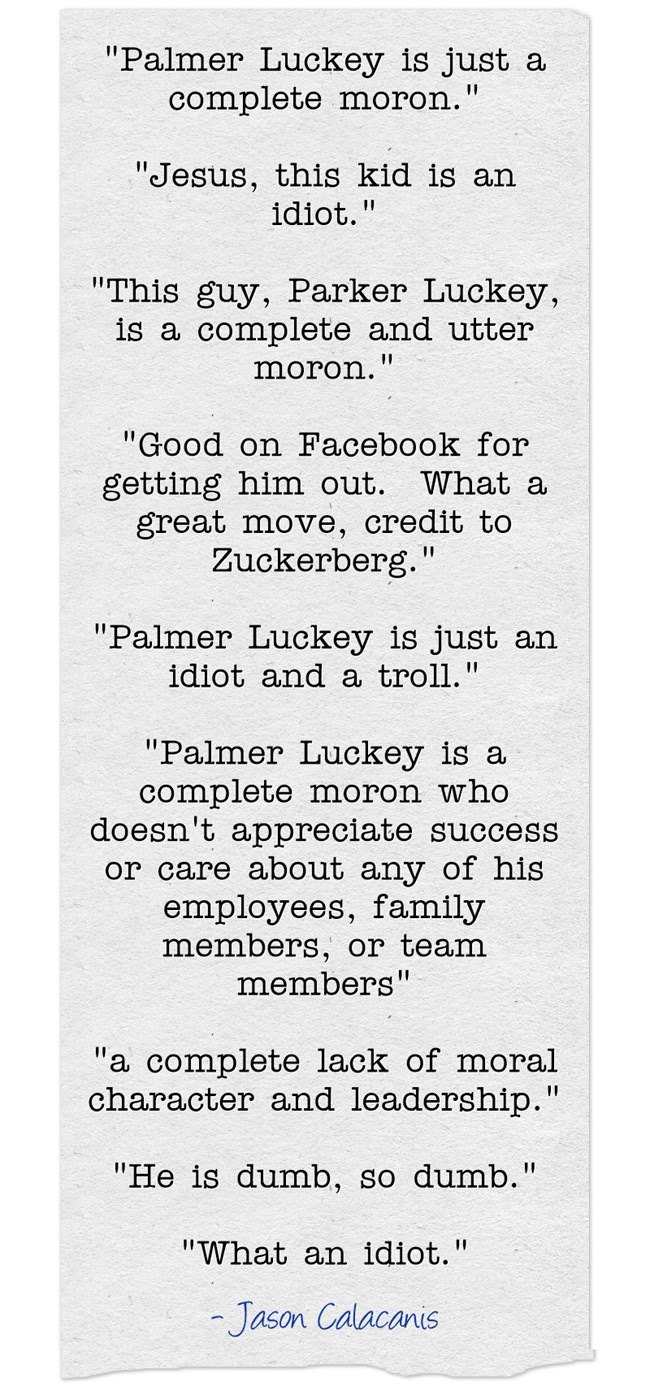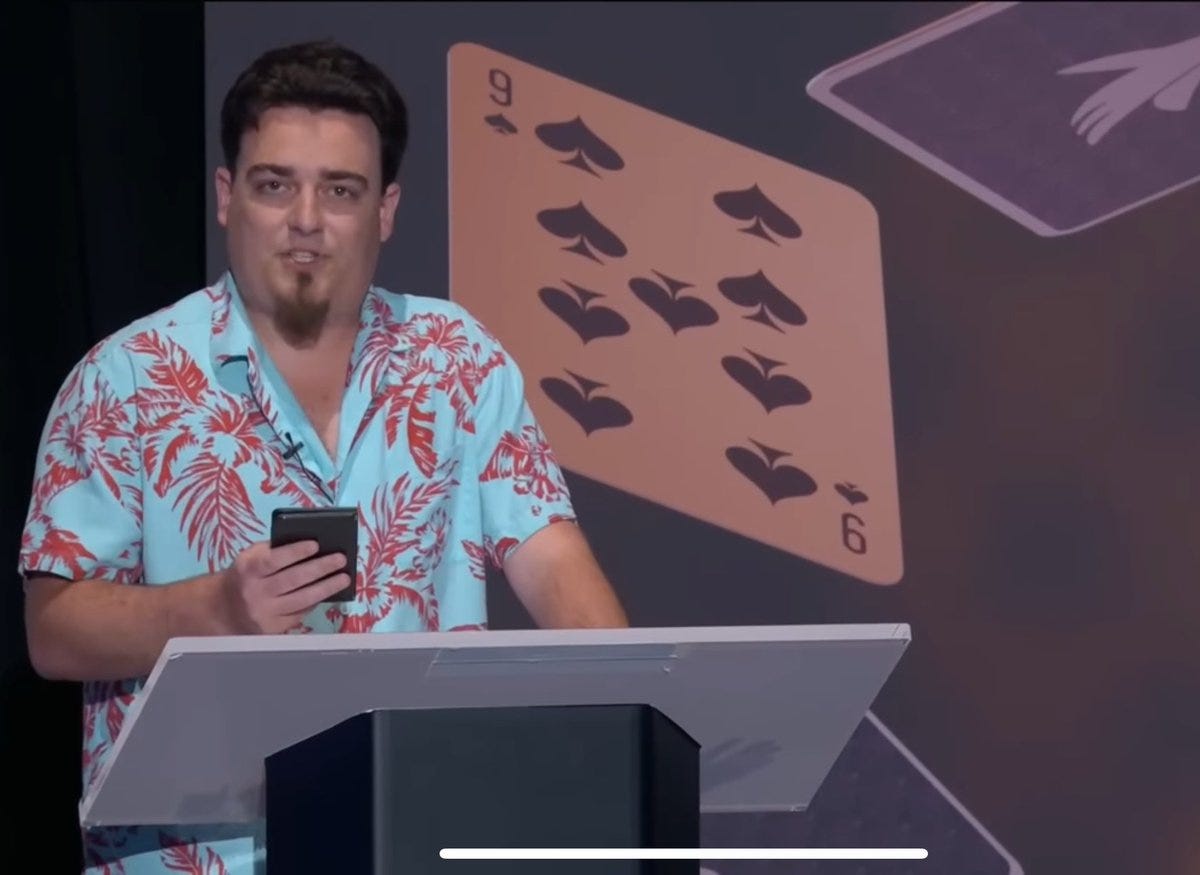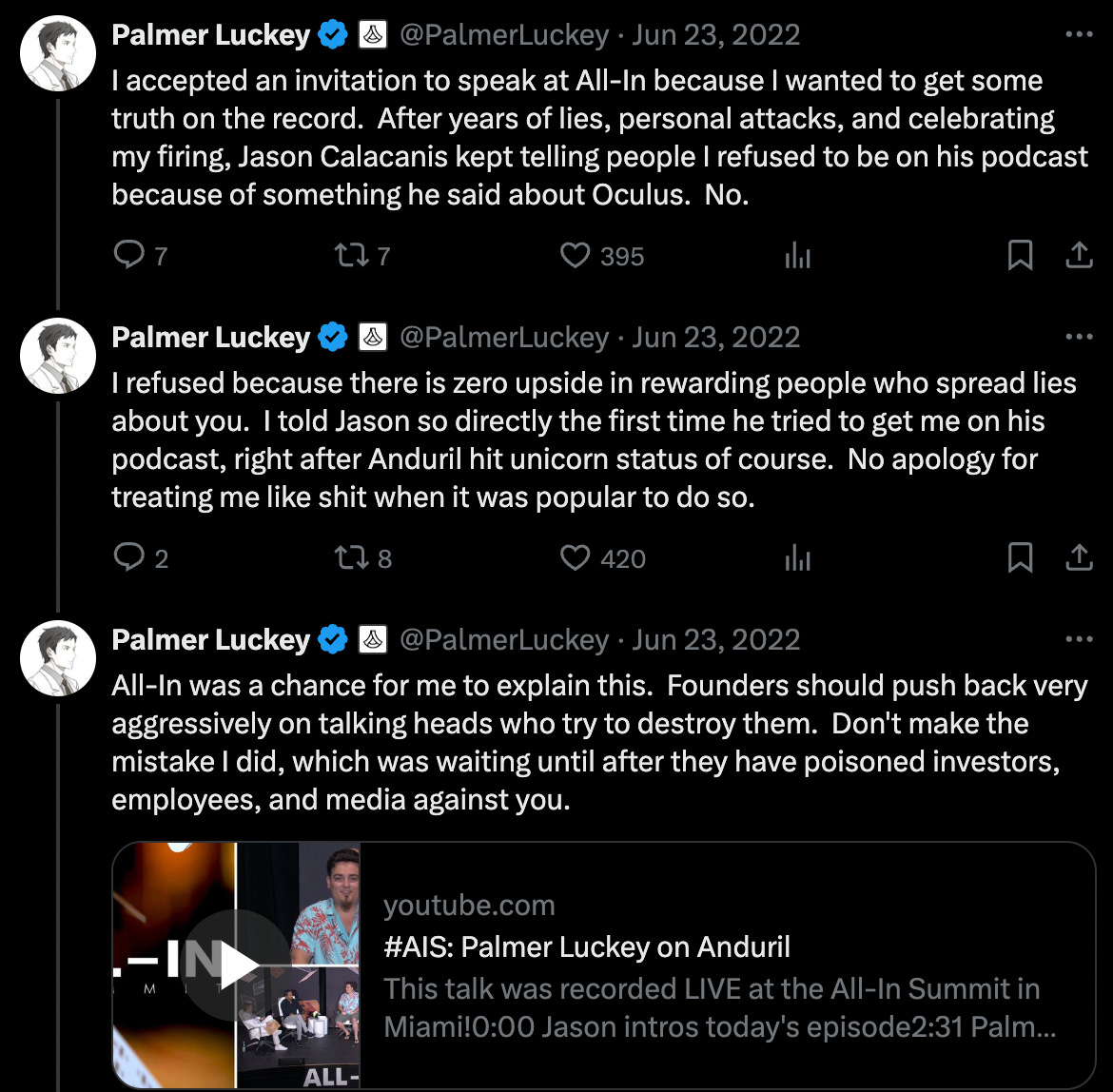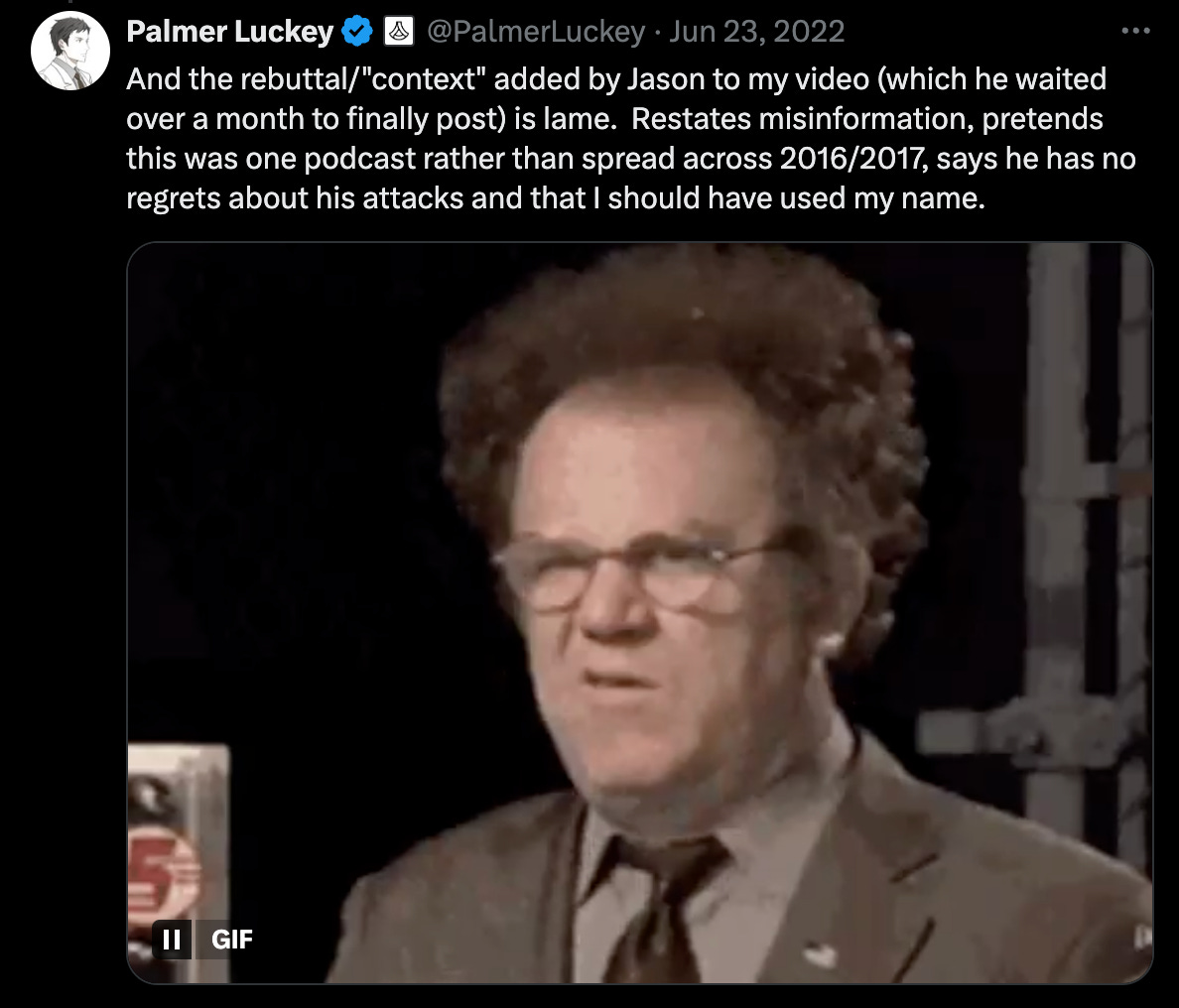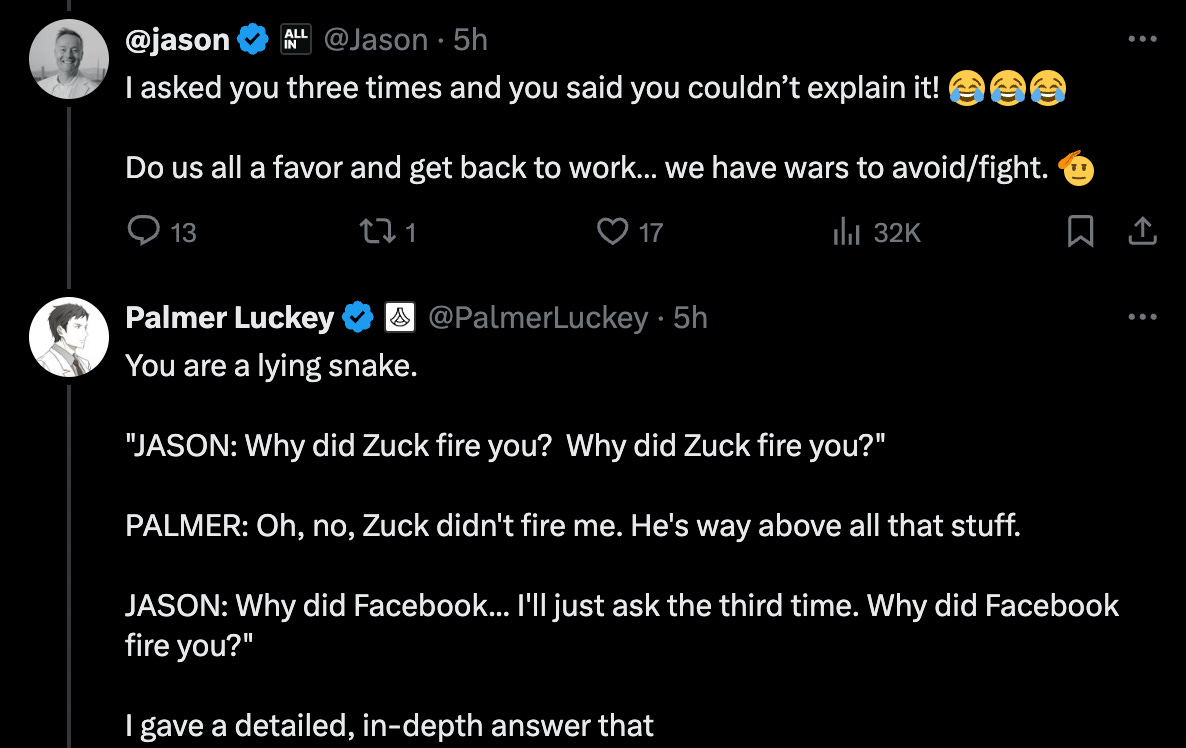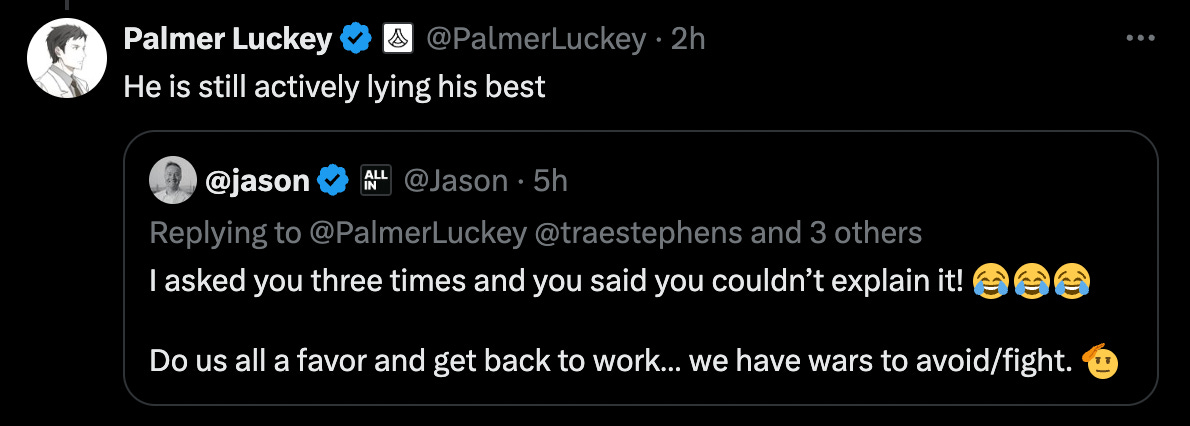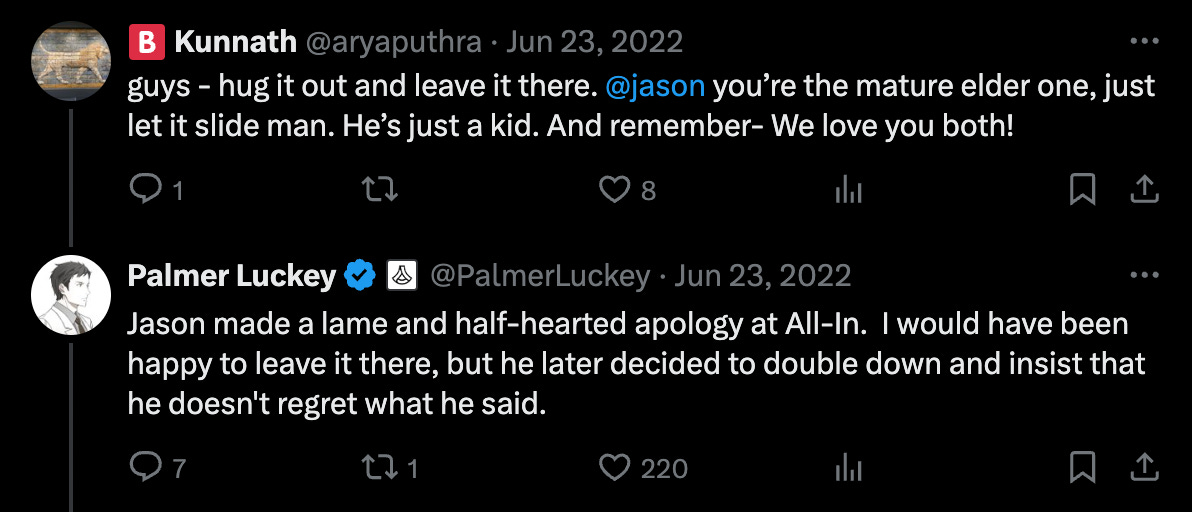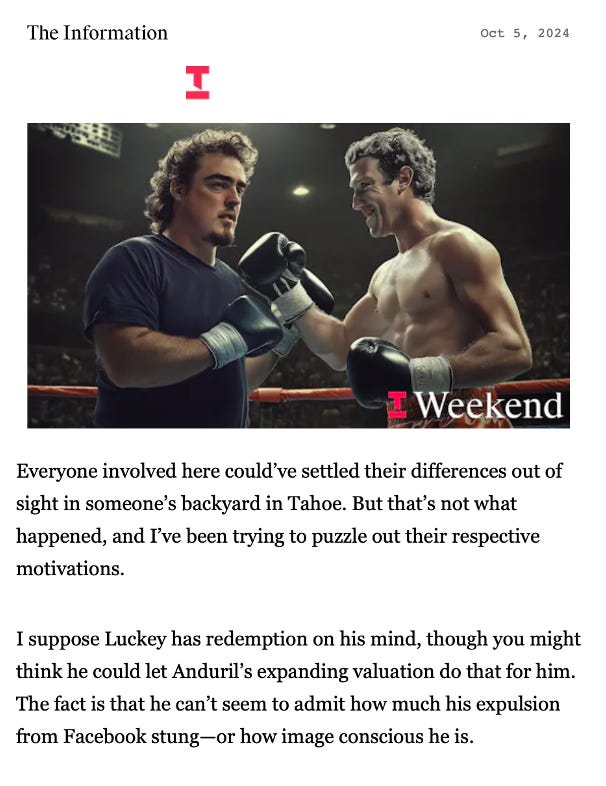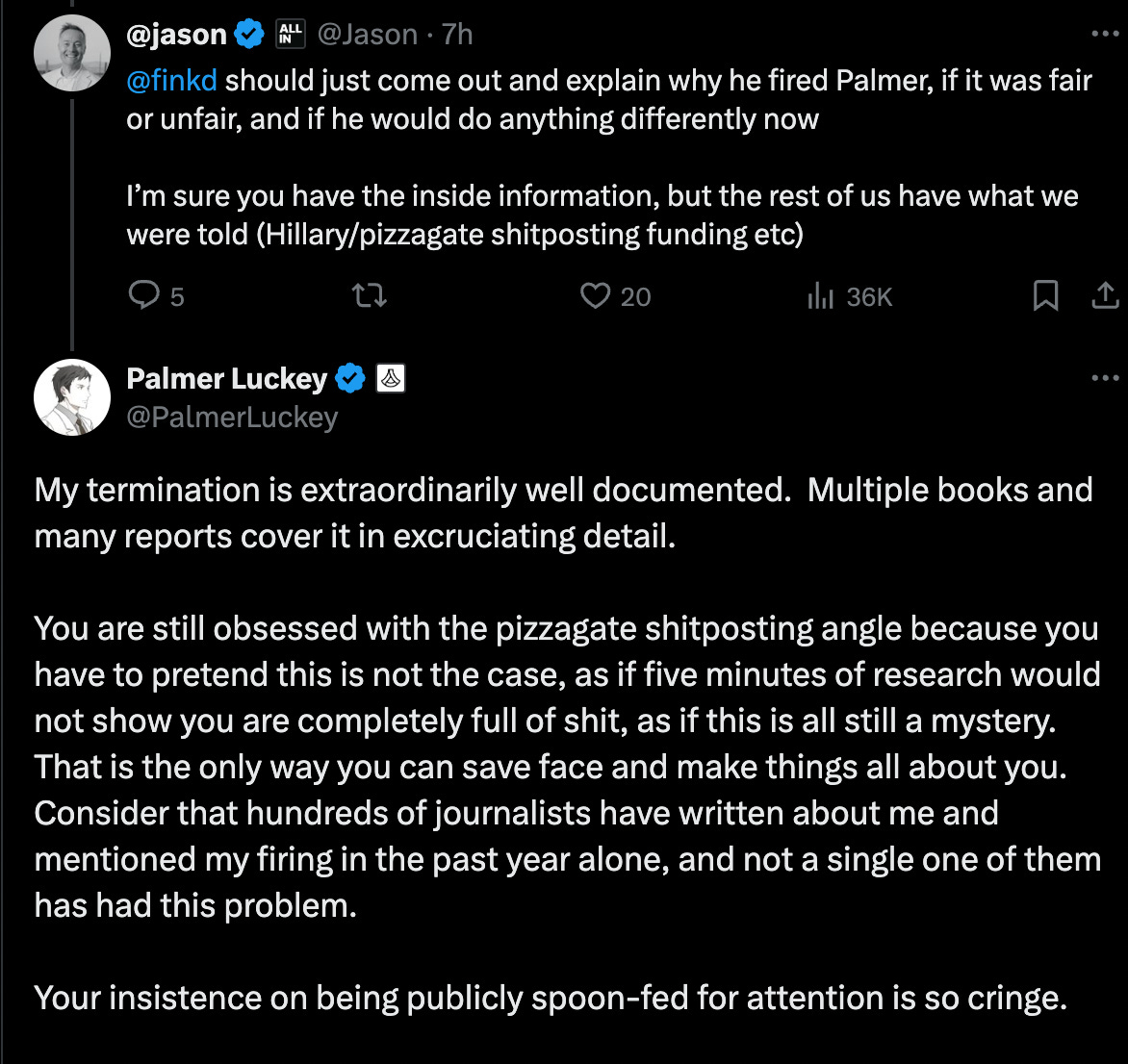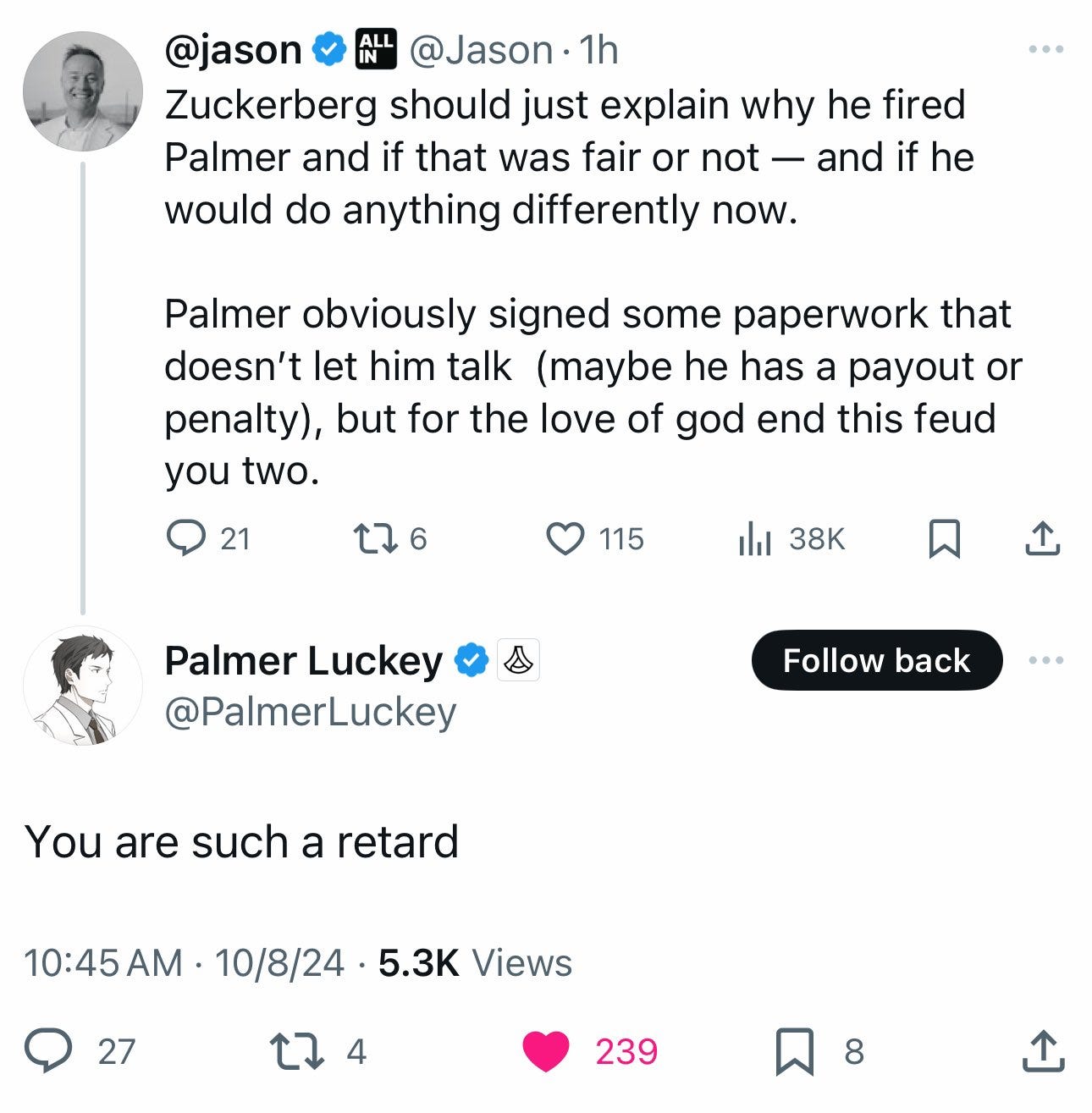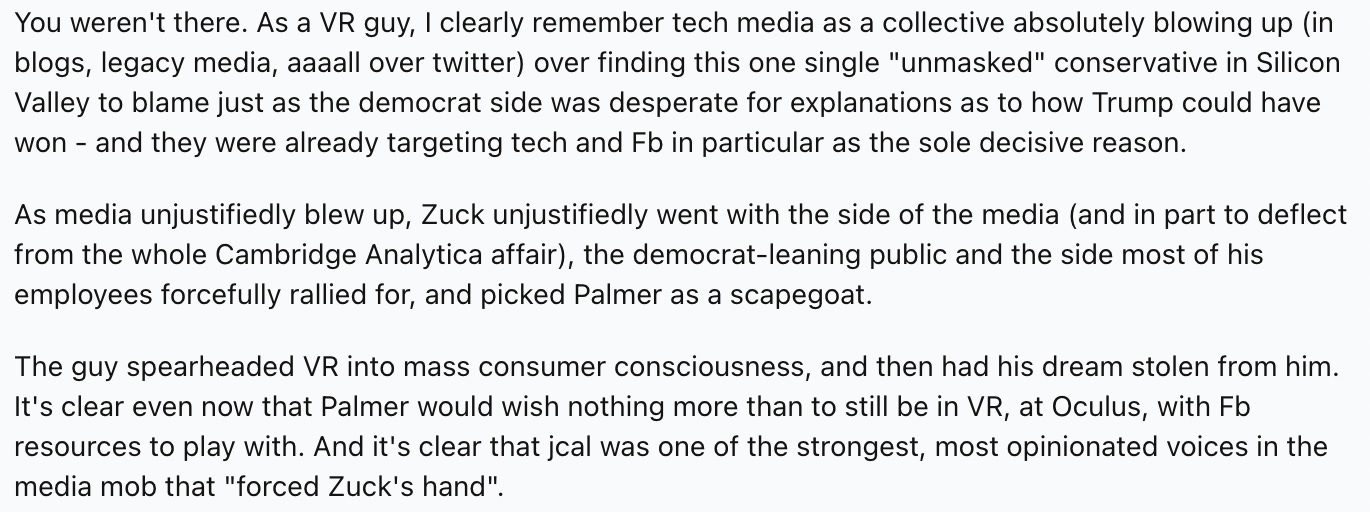When Politics Meets Technology: The Fallout Between Palmer Luckey and Jason Calacanis
The nearly decade-long war between billionaire Palmer Luckey, founder of Oculus VR (Meta’s VR glasses) and Anduril (the hugely successful defense contractor), and Jason Calacanis, a well-known angel investor and All-In Podcast bestie, shows no signs of cooling.
The conflict began in 2016 when it was revealed that Luckey had funded a political group responsible for creating anti-Hillary Clinton memes during the U.S. presidential election, triggering criticism in certain Silicon Valley circles and backlash within the Bay Area tech community over the perceived negative political consequences.
Calacanis was one of the most vocal critics, condemning Luckey's involvement and suggesting that it could harm the tech sector's image. Luckey viewed this criticism as an attack on free speech and personal beliefs, accusing figures like Calacanis of trying to stifle differing political views. Their conflict reflects a broader ideological divide in the tech world, with Luckey's more libertarian leanings clashing with Calacanis's alignment with the progressive attitudes prevalent in Silicon Valley. This has resulted in increasing discontent between the two, which will continue to fester.
Meta (formerly Facebook) acquired Luckey’s Oculus VR for approximately $2 billion in March 2014. The deal, which involved both cash and stock, represented a substantial investment in virtual reality technology by the company, reflecting its ambitions to lead in this emerging market. However, the relationship between Meta and Oculus took a controversial turn in 2017 with Palmer Luckey's firing.
The reasons behind Luckey's dismissal remain somewhat ambiguous, as Meta has not provided a concrete explanation for his departure, and both Luckey and the company have been cautious in their public statements. However, several factors likely contributed to the decision. In 2016, it was revealed that Luckey had financially supported Nimble America, a pro-Trump political group that produced inflammatory anti-Hillary Clinton memes during the U.S. presidential campaign. This revelation sparked public outcry, particularly in Silicon Valley, where political opinions typically lean progressive. Reports indicate that many within Meta were dissatisfied with Luckey's political activities, and although the company denied that his views were the cause of his firing, the negative media attention and internal dissent likely created pressure for them to take action.
Luckey's firing came shortly after Meta was involved in a legal battle with ZeniMax Media, the former employer of John Carmack, who became Oculus's CTO. ZeniMax claimed that Oculus had used proprietary technology in developing the Oculus Rift. While Luckey wasn’t the primary figure in the legal case, his involvement in Oculus’s leadership during this period may have contributed to a tense environment within Meta, particularly given that Meta was ordered to pay $500 million in damages (later reduced).
Beyond the political and legal controversies, speculation arose that Luckey’s eccentric personality and outspoken views conflicted with Meta’s more corporate and controlled image. Known for his libertarian beliefs, Luckey's ideology often diverged from the culture that Meta aimed to cultivate. Following the acquisition, Meta's leadership may have perceived Luckey’s continued presence as a potential liability to the company’s brand and reputation. His outspoken Republican views frequently put him at odds with the predominantly liberal sentiments of Silicon Valley, and his controversial actions, such as funding initiatives that supported Trump, further alienated him from many within the tech community, contributing to a negative perception that persists among his peers.
Commentators on Reddit have suggested that Luckey was effectively scapegoated for the negative political climate of the time. His high-profile departure from Oculus was not solely about his business decisions; it was also closely tied to public reactions to his political affiliations and funding choices.
In the intervening years, Luckey has accused Jason Calacanis of being a bully and, true to his business savvy, always has receipts.
After being fired from Meta, Luckey meticulously tracked his critics, keeping a mental note of those who had kicked him while he was down as he made his comeback in Silicon Valley. When he was, again, the toast of the town, Calacanis invited him to a fireside chat at the All-In Summit. Midway through his presentation, Luckey took the opportunity to eviscerate Calacanis, highlighting examples of hypocrisy and the Silicon Valley toxicity that Luckey believed Calacanis embodied.
Despite this, he still shook Calacanis's hand afterward. To ease the tension, fellow attendee David Friedberg called out Calacanis for alienating others and leaving wounds unaddressed. It was evident that Luckey saw his voice as a means of speaking truth to power, and he acknowledged this responsibility during his takedown.
Here’s Luckey’s speech forwarded to the direct criticisms of Calacanis.
I share the view that Luckey is one of the most remarkable tech entrepreneurs, while Calacanis, coming from a media background, relies on a contrarian viewpoint and sharp tongue to stand out among many voices. This dynamic often leads to conflicts, but it’s essential for journalists to promptly apologize when they misrepresent or offend someone in the marketplace of ideas, especially if they want to work with them or act nice at conferences. Although venture capital often resembles the Olympics of thought leadership, it doesn’t have to be a full-contact sport; fostering respectful dialogue can lead to more productive outcomes for everyone involved.
Then this week a story in the well-respected The Information opened some still very sore wounds.
The article goes into recent public reconciliation efforts between Palmer Luckey, co-founder of Oculus and Anduril, and Mark Zuckerberg highlight the absurdity of grudges in Silicon Valley. Their strained relationship began in 2016 when Facebook fired Luckey, who had been a controversial figure due to his support for Donald Trump. The reconciliation kicked off when Zuckerberg expressed regret about Luckey's departure through a spokesperson, framing Luckey’s work at Anduril as vital for national security. This week, Luckey and Andrew Bosworth, Meta's CTO, publicly celebrated Luckey's visit to see Meta’s new augmented reality glasses, with Bosworth issuing a public apology that Luckey shared. Despite the opportunity for a private resolution, their motivations remain puzzling, with Luckey seemingly seeking redemption and Zuckerberg navigating his awkward relationship with Silicon Valley's right wing. Meanwhile, Elon Musk intensifies his ongoing feud with OpenAI, highlighting the persistent drama in the tech industry.
Calacanis stepped in and reopened a sore spot that he knew would irritate Luckey, causing tensions to flare up once more.
The Pizzagate scandal, which emerged during the 2016 U.S. presidential election, revolved around baseless conspiracy theories accusing Comet Ping Pong, a pizzeria in Washington, D.C., of being involved in a child trafficking ring linked to prominent Democrats, including Hillary Clinton. While Palmer Luckey was not directly implicated in the conspiracy, his association with it caused significant tension within Silicon Valley.
Following the election, the scandal escalated, culminating in a violent incident where an individual entered Comet Ping Pong armed with a firearm, demanding answers about the alleged trafficking. This event highlighted the dangers of misinformation and the real-world consequences of conspiracy theories, linking Luckey's name to a narrative that many in the tech industry found deeply troubling. Ultimately, while he was not a primary actor in the Pizzagate conspiracy, his political affiliations and financial backing of a group that propagated such theories led to backlash and controversy, significantly affecting his public image and standing within the tech community.
I find it troubling that someone has to hide their political beliefs from those who might exploit them for their own gain or that anyone would sift through donation or voting records to stir up discord. However, I also believe that if you’re at work, your priority should be to fulfill your responsibilities and support the leadership and culture they are striving to create.
On Reddit, which I like to call the source of all truth, there's a popular opinion that Zuck was forced to act because of the ongoing political pressure stemming from the recent Cambridge Analytica scandal. Here’s their take:
I've had the opportunity to hear Luckey speak several times, and I'm genuinely impressed by his accomplishments in such a short time, as anyone would be. As a self-made billionaire, he could very well find himself on the Mount Rushmore of tech entrepreneurs by the end of his career and is ahead of schedule getting there. However, I’m reminded of the applause he received at the All-In Summit when he acknowledged his notoriously thin skin for a billionaire—a sentiment that seemed to resonate with the audience, perhaps because they were Calacanis fans being hosted at his event. While having a thick skin is essential for maintaining success, it does not absolve those who choose to pile on when it’s convenient or for attention from facing the consequences of their actions.
Calacanis has done a lot of good by introducing many people to the venture community, speaking at events I’ve been at like San Diego Tech Week, and nurturing the next generation of entrepreneurs through his compelling angel investing book. However, his sensationalist opinions and hot takes often come off as more biting than necessary to effectively make a point.
While this approach generates more clicks, for someone who has succeeded in tech through savvy investments in companies like Uber, Calm, Robinhood, Evernote, and Weblogs, a more statesmanlike level of restraint might be wise. While his confrontational New York personality has undoubtedly played a role in his rise from the scrappy borough of Brooklyn, that same attitude doesn't have to follow him forever.
Both men have achieved success through their media savvy or entrepreneurial brilliance, and I eagerly anticipate their ability to resolve their differences, put their egos aside, and reach a détente. The tech community deserves nothing less.



